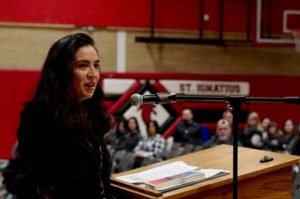Seven Fallen Feathers author addresses Thunder Bay education leaders

By Rick Garrick
THUNDER BAY—Seven Fallen Feathers author Tanya Talaga emphasized how her book is part of the Thunder Bay Catholic District School Board’s curriculum at the board’s Truth and Reconciliation Professional Development Sessions.
“You are really on the forefront — it’s really wonderful to see all the work that you’ve been doing with trying to bring Indigenous knowledge and education to this city and to the kids,” Talaga says during her March 1 keynote presentation to the board’s staff and members of the Northern Ontario Education Leaders at St. Ignatius High School in Thunder Bay. “It is so important and I am so proud of your board for the work you have been doing. When I go across Canada … I always mention your board, your board being, I believe, the first to bring my first book, Seven Fallen Feathers, into the curriculum in Grade 11 English.”
Talaga, a Toronto Star journalist whose grandmother is from Fort William First Nation, also spoke about her journey to write her second book, All Our Relations, during her presentation.
“I began to look at the alarming rate and the rise of suicides in our communities, here and the 634 First Nations across this country,” Talaga says, noting that she also looked at Norway, Brazil, Australia and the United States. “There’s a reason why I looked at all those nations — they were all colonized nations, all nations with Indigenous people with many similarities.”
Talaga says the common factor she found in all of those countries was the “violent separation” of Indigenous people from the land.
“In all of those places I just spoke of, all those countries, we saw a separation of Indigenous people from where they lived and the separation of individuals from their traditional way of life,” Talaga says. “And that has led to a spiritual separation that has left an enduring impact on generations of our children. And we are still wrestling with all of this, we are still wrestling with the colonial legacy, still fighting to overcome it.”
The Truth and Reconciliation Professional Development Sessions also featured a keynote presentation by Charlene Bearhead, education coordinator for the National Inquiry of Murdered and Missing Indigenous Women and Girls.
“We are only three years post-TRC, a little over three years from the release of the Final Report of the Truth and Reconciliation Commission,” Bearhead says. “Now people had 150 years, 200 years, 300 years to interfere, wreak havoc, cause damage, but somehow it always happens that when it is time to take action and a document is actually going to support something like that you’re supposed to have it done in one year or three years or 10 years.”
Bearhead notes that some people say they have “got the truth” about residential schools and question why they have to continue hearing about it.
“I don’t think we’ve got it because we see things happening every single day that prove to me that we obviously don’t ‘got it’,” Bearhead says. “There’s lots of truth that still needs to be heard, needs to be told, and there’s certainly a lot of truth that needs to be acknowledged.”
Bearhead adds that she has been asked if people need to acknowledge the traditional territory they are on every time they talk.
“So my response to the people I work with every day, school boards and superintendents in Alberta, is ‘you’re probably right — do we have to sing O Canada every time we have a gathering?’,” Bearhead says. “We all know we’re in Canada, we’ve got it, we’re good, let’s just pass on that piece.”


